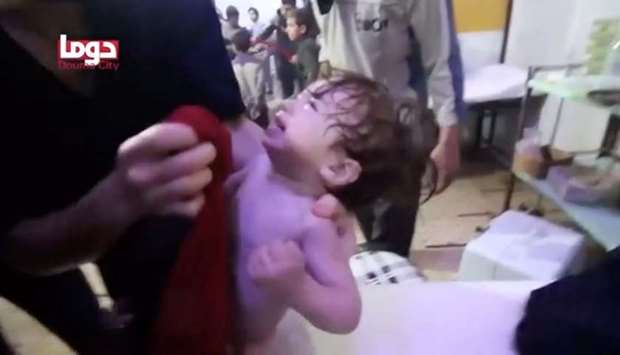* UN war crimes team say perpetrators must be identified
* Call to preserve evidence from suspected attack site* Russian military police deployed in Douma
United Nations war crimes investigators on Friday condemned the suspected use of chemical weapons in the Syrian town of Douma in eastern Ghouta and called for evidence to be preserved with a view to future prosecutions.
International chemical weapons experts were travelling to Syria to investigate an alleged gas attack by government forces on Douma which killed dozens of people.
Two days ago US President Donald Trump warned that missiles "will be coming" in response to that attack, leaving open the prospect of Western military action that could lead to confrontation with Russia.
"Perpetrators of such attacks must be identified and held accountable," the UN's International Commission of Inquiry on Syria said in a statement, noting that the use of such weapons is strictly banned under a global treaty ratified by Syria.
"We stress the imperative need to preserve evidence, and call upon all relevant authorities to ensure no party tampers with suspected sites, objects, witnesses, or victims before independent monitors and investigators are able to access the area," it said.
Noting that inspectors from the Organisation for the Prevention of Chemical Weapons (OPCW) were due to visit the site shortly, it underlined the Damascus government's commitment that they will have full access and freedom of movement.
Russia has said it deployed military police in Douma on Thursday after the town was taken over by Syrian government forces.
The World Health Organisation (WHO), citing health partners, said on Wednesday that around 500 people had been treated for "signs and symptoms consistent with exposure to toxic chemicals" in Douma.
The UN human rights investigators, led by Brazilian Paulo Pinheiro, say they have documented suspected war crimes committed by all sides in the seven-year conflict, as well as alleged crimes against humanity by Syrian government forces.
They have documented 34 chemical weapons attacks in Syria since 2013, including 26 which they attribute to Syrian government forces, the most recent one on the Harasta frontline in eastern Ghouta in Nov 2017. The perpetrators of the remaining six have not been identified sufficiently.
Pinheiro's team, set up in August 2011, has have never been allowed into Syria. Its reports have been based on interviews with more than 6,000 victims and witnesses, videos, documents, satellite imagery, forensic evidence and military analysis.

